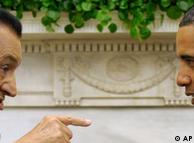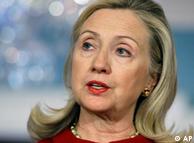ARAB WORLD | 08.01.2012
Washington reaches out as Egyptian Islamists extend lead
Egypt's Muslim Brotherhood has extended its lead in the final round of the country's parliamentary election.
In the country's first free legislative vote in decades, the Democratic Alliance list - a coalition dominated by the Brotherhood's Freedom and Justice party - says it has won 41 percent of the seats so far, while the hardline Islamist Al Nour party is in second with around 20 percent of the seats.
According to state television, the Democratic Alliance has won seven of the nine governorates where the balloting was held on January 3-4. The list also won six of the 50 seats for individual candidates while Al Nour secured only one such seat. The remaining 43 seats will be decided in a runoff vote on January 9-10.
The Muslim Brotherhood was banned under ousted President Hosni Mubarak, but in the course of last year's uprising, the party quickly emerged as a major force thanks to its well-organized structures and support bases.
Liberals weakening
Non-religious parties have performed poorly in the election so far. The liberal Egyptian bloc and the Waft party have both secured around 9 percent, while former Mubarak loyalists have won around four percent of the vote.
Eleven percent of the 498-seat parliament are as yet undecided. Final results are expected later in January with the Muslim Brotherhood widely expected to dominate the new parliament.
The new assembly's prime task will be to select a 100-strong body to draft a new constitution for the post-Mubarak Egypt.
'Limited contacts'
With the Muslim Brotherhood expected to be the dominant political force in Egypt's imminent political future, the United States has begun reaching out to the Islamist movement.
"It's clear that they are now the only game in town," Marina Ottaway, head of the Middle East program in Washington for the Carnegie Endowment for International Peace told the AFP news agency.
Seeing the Brotherhood dominate Egypt's political scene has the West concerned about the group's attitude towards Israel, minorities and the role of women. Yet even before the poll, US Secretary of State Hillary Clinton said Washington had pursued "limited contacts" with the Muslim Brotherhood in light of Egypt's political changes.
 Mubarak was seen as a close ally of the West in the Middle East
Mubarak was seen as a close ally of the West in the Middle East
Clinton's spokeswoman Victoria Nuland said last week that the US had "some good reassurances from different interlocutors" regarding Egypt's international obligations and the peace treaty with Israel.
"We will continue to seek those kinds of reassurances going forward," she added.
Egypt has long been a cornerstone of US policy in the Middle East. In 1979, Egypt was the first Arab country to sign a peace treaty with Israel and ousted leader Mubarak was seen by the West as a major partner in stabilizing the region and preventing the Palestinian-Israeli conflict from escalating.
But the Muslim Brotherhood is widely considered to be close to militant Islamist Palestinian group Hamas and therefor more hostile to Israel.
Author: Andreas Illmer (dpa, Reuters, AFP)
Editor: Ben Knight
Editor: Ben Knight
dw



No comments:
Post a Comment